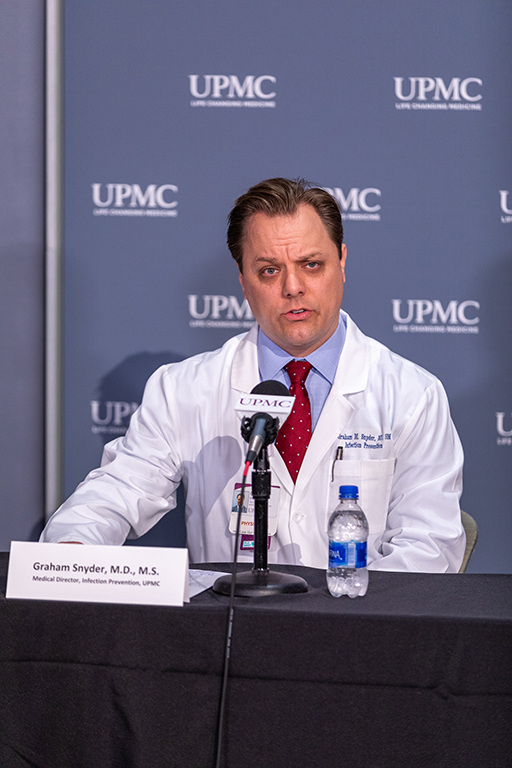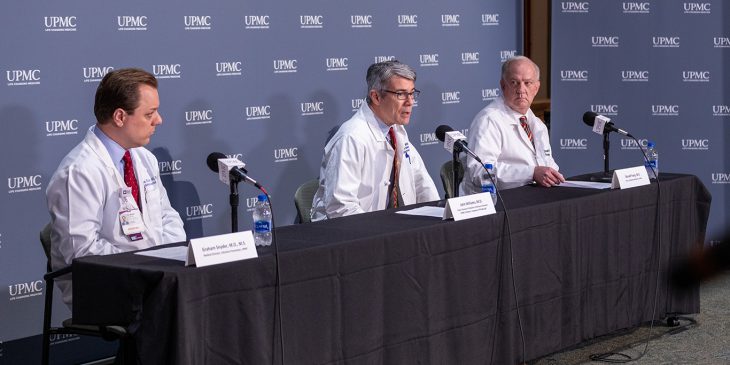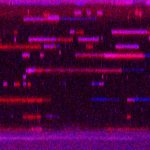The Pittsburgh region is not yet seeing widespread transmission of COVID-19, according to research done by UPMC clinicians, indicating that the health system’s “nuanced” approach to elective procedures is sound, UPMC doctors explained today at a media briefing.
 “‘Elective’ is a broad and indistinct term – many scheduled care opportunities, often called ‘elective’ whether cancer care, valve replacement of the heart or hernia repair, address important needs that cannot always be safely delayed,” said Dr. Donald Yealy, chair of emergency medicine at UPMC. “We continue to rely on the expertise of our world-class clinicians who, together with their patients, determine which care can be delayed without harm, with an eye toward keeping vulnerable patients as safe as possible.”
“‘Elective’ is a broad and indistinct term – many scheduled care opportunities, often called ‘elective’ whether cancer care, valve replacement of the heart or hernia repair, address important needs that cannot always be safely delayed,” said Dr. Donald Yealy, chair of emergency medicine at UPMC. “We continue to rely on the expertise of our world-class clinicians who, together with their patients, determine which care can be delayed without harm, with an eye toward keeping vulnerable patients as safe as possible.”
Yealy described UPMC’s stance toward elective procedures after Dr. John Williams, chief of the Division of Pediatric Infectious Diseases at UPMC Children’s Hospital of Pittsburgh, updated the findings of UPMC’s community surveillance research testing: Out of 950 tests performed on people with moderate cold symptoms since mid-February, only five adults were positive for COVID-19 and no children.
“We do not see widespread community transmission yet – and no sign that Pittsburgh is a cluster of concerning activity,” Williams said. “But that does not mean anyone should let down their guard. COVID-19 is still a critical public health threat.”
UPMC also announced that its initial specimen collection facility in Pittsburgh’s South Side neighborhood was off to a good start. The facility safely collects nasal samples from people suspected of having COVID-19 using a UPMC-developed test. Specimen are sent to the health system’s Clinical Laboratories unit, which returns results in as little as eight hours, or the state’s Department of Health laboratory or commercial labs. UPMC prioritizes which testing method to use based on its assessment of the likelihood of each case being positive and whether the patients are quarantined at home or in a health care facility, though it is now relaxing it’s testing qualifications to include any patient whom a physician believes warrants testing.
After opening the South Side facility, UPMC immediately began developing regional collection centers for other communities that it serves across multiple states, starting in Harrisburg, Erie, Williamsport and Altoona. Those sites are all expected to open early next week.
Dr. Graham Snyder, medical director of infection prevention and hospital epidemiology at UPMC, said that UPMC’s laboratory is now performing 80 tests a day and expects to double that next week. To date, 28 patients have tested positive – four of them inpatients at various UPMC facilities, the remainder outpatients quarantined at home with public health guidance and clinical supervision.
that UPMC’s laboratory is now performing 80 tests a day and expects to double that next week. To date, 28 patients have tested positive – four of them inpatients at various UPMC facilities, the remainder outpatients quarantined at home with public health guidance and clinical supervision.
“Setting up our own testing has been an extraordinary, multidisciplinary effort – involving doctors, nurses, lab workers, infection control, supply chain and many others,” Snyder said. “We want to thank this incredible team for making this testing available to help ease the anxiety of our patients and, most importantly, to ensure that we are providing effective and safe care.”
UPMC will be regularly updating the community on this developing situation. Follow UPMC News for updates.









